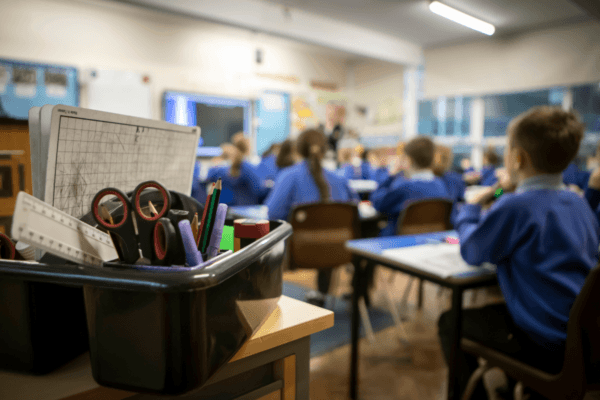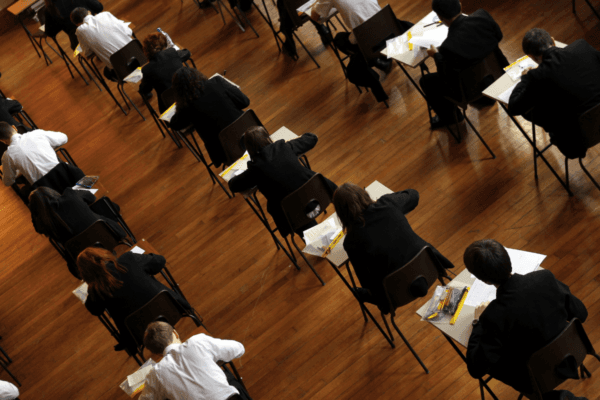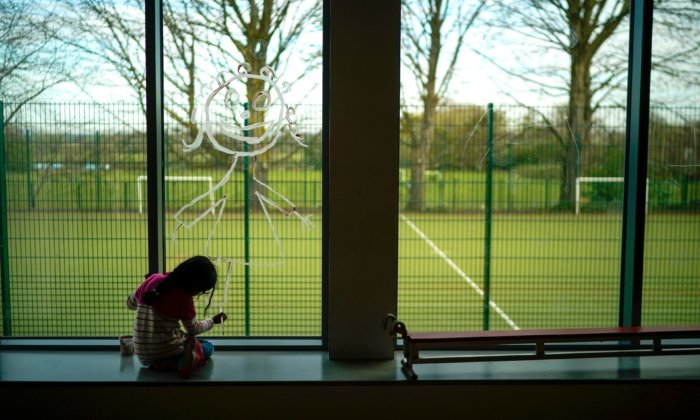Study shows that children who started school during lockdown have damaged learning prospects
A researcher has issued a warning that the ‘worst legacy of all’ from the lockdowns could be ‘the damage to the education of a whole generation of children.’
Lockdown-induced school closures are said to have a “significant damaging” effect on the educational prospects of children who began school during the COVID-19 period, according to academics.
A study funded by the Nuffield Foundation and released on Wednesday suggests that the “educational damage” resulting from widespread school closures in England will affect children “well into the 2030s,” with future generations facing the biggest declines in GCSE test results “for at least two decades.”
Researchers from the universities of Exeter, Strathclyde, and the London School of Economics found that children aged 5 at the time of Covid school closures are predicted to have difficulty achieving 5 good GCSEs, with boys 4.4 percentage points less likely to do so and girls 4.8 percentage points less likely.
It is estimated that by 2030, less than four in ten pupils will achieve grade 5 or above in English and mathematics GCSEs, compared to 45.3 percent of pupils in England achieving this benchmark in 2022/2023.
Lee Elliot Major, a professor of social mobility at the University of Exeter and one of the report authors, stated, “We’ve had many debates about the pandemic, but it could be that the most damaging consequence is the impact on the education of an entire generation of children.”
Professor Elliot Major cautioned that the lower GCSE results will affect successive cohorts of children well into the 2030s, indicating a decline in the country’s social mobility levels.
“If we don’t take action to address this, many children will face limited life opportunities as a result,” he added.
Long-Term Prospects
The report titled “A Generation at Risk” also investigated the educational outlook for older children, revealing that the socio-economic gap in basic GCSE grades for individuals aged 11 at the time of lockdown school closures is anticipated to “significantly widen” by 4.5 points for boys and 4.3 points for girls.
“This leads to a 32-percentage point socio-economic gap in standard passes in English and maths GCSEs from 2024,” the report outlined.
The researchers also examined the long-term implications for the economy and income mobility. They projected that due to diminished lifetime earnings, the educational harm caused by these lockdowns will have a detrimental economic impact, amounting to an aggregate economic cost of £31.4 billion in today’s prices.
The study foresees that for children aged 11 during the lockdown, the link between parental and child income will see a 15 percent increase for girls and 12 percent for boys. “By global standards, this signifies a substantial decline in income mobility,” as reported in the study.
“These findings indicate a dual blow to the educational progress of successive Covid generations: they are on track for the most significant overall decline in basic GCSE achievement in at least two decades, and a substantial widening of the socio-economic gap in GCSE prospects,” stated the report.
Declines in Socio-Emotional Skills
Authors emphasized the significance of the “socio-emotional development” of children in these age groups and how it was impacted by the lockdown.
“Children experienced a notable decrease in socio-emotional skills,” the report stated, asserting that in combination with the decline in cognitive skills, pupils’ overall development will be stunted at every stage of life.
“Socio-emotional development is just as crucial as cognitive skills in influencing children’s future educational and life prospects,” the authors pointed out, including the achievement of good GCSE grades and respectable salaries post-education.

The report highlighted that school closures not only deprived children of face-to-face learning access but also the various other benefits that schools offer, from emotional support to social interaction.
Emily Tanner, the program head at the Nuffield Foundation, commented, “The accumulating evidence on the long-term impact of learning loss on young people’s development underscores the importance of students developing socio-emotional skills alongside academic learning.”
Risk Failing a Generation
To address the damage, authors propose a series of reforms, such as redistributing the school calendar to evenly spread disruptions, which they believe will enhance the well-being of teachers and students.
Other recommendations include utilizing trained undergraduate tutors to provide academic and mentoring support to students and implementing an “enrichment guarantee” in schools to ensure that all children can benefit from extracurricular activities that promote socio-emotional skills.

The authors concluded, “Failure to rebalance the education system will risk failing a generation damaged from learning losses and declines in socio-emotional skills. The likely fall in income mobility levels will cast a long shadow over our society for decades to come.”
In response to the report, a Department for Education spokesperson stated, “We have allocated nearly £5 billion since 2020 for education recovery initiatives, which have aided millions of pupils requiring additional assistance. We are also supporting disadvantaged students through the pupil premium, which is increasing to almost £2.9 billion in 2024-2025, the highest in cash terms since this funding initiative began.”
The spokesperson added, “This is in addition to our continuous £10 million allocation for Behavior Hubs programs and £9.5 million for up to 7,800 schools and colleges to train a senior mental health lead.”
PA Media contributed to this report.





